Battery disconnects
Battery disconnects
Now that a fair few of us are embarking on this DIY battery trail I thought I might canvas for opinions on what people are using for hooking all this stuff together.
For starters - battery disconnects. I want to be able to shut off DC power from my inverter with one quick action should SHTF, potentially at high currents. Normally I try and cut down the load first, generally by just flipping my AC breaker for the inverter first.
As we know breaking a large DC current is no laughing matter, and a battery disconnect between battery and inverter has to deal with current that can possibly flow both ways (charging and discharging).
I've seen some reports around that some DC breakers are only good for one way current (like a solar panel, which can only ever supply current one way), and if used in reverse then the arc suppressing mechanism actually makes things worse and can sustain the arc, starting a fire in the breaker. For example:
A lot of switches don't seem to be rated for high-current switching either? I have one of these between my batteries and inverter right now: https://www.12voltplanet.co.uk/victron- ... -275a.html .. but the other day I switched it back on after doing some work on the batteries (so it was off for a good half hour) and there was a heck of a spark inside it; capacitors in the inverter charging back up and causing inrush presumably. So I'm not sure I trust that in an emergency to cut 70A+ really.
One possibility is maybe a NH00 fused disconnect (https://www.bimblesolar.com/DC-fuse-disconnect-1pole) - that's still probably going to spark but little chance of anything welding closed in those I think, they're pretty meaty contacts, and you can create a huge gap between the contacts and the fuse by opening the door. I have these on each of my battery<->busbar links for individual battery isolation and protection (100A fuse in each one).
Another idea I'm considering, though they're not cheap, are specifically breakers that say they're rated for batteries, sometihng like https://voltaconsolar.com/protection-mo ... -500v.html.. but by the time you spec it up to 250A and add a case its nearly 200 quid. Right now I'm thinking i'll replace my switch with one of these though.
Sorry this got a bit long and rambly but I'm interested to hear what others use for this purpose.
For starters - battery disconnects. I want to be able to shut off DC power from my inverter with one quick action should SHTF, potentially at high currents. Normally I try and cut down the load first, generally by just flipping my AC breaker for the inverter first.
As we know breaking a large DC current is no laughing matter, and a battery disconnect between battery and inverter has to deal with current that can possibly flow both ways (charging and discharging).
I've seen some reports around that some DC breakers are only good for one way current (like a solar panel, which can only ever supply current one way), and if used in reverse then the arc suppressing mechanism actually makes things worse and can sustain the arc, starting a fire in the breaker. For example:
A lot of switches don't seem to be rated for high-current switching either? I have one of these between my batteries and inverter right now: https://www.12voltplanet.co.uk/victron- ... -275a.html .. but the other day I switched it back on after doing some work on the batteries (so it was off for a good half hour) and there was a heck of a spark inside it; capacitors in the inverter charging back up and causing inrush presumably. So I'm not sure I trust that in an emergency to cut 70A+ really.
One possibility is maybe a NH00 fused disconnect (https://www.bimblesolar.com/DC-fuse-disconnect-1pole) - that's still probably going to spark but little chance of anything welding closed in those I think, they're pretty meaty contacts, and you can create a huge gap between the contacts and the fuse by opening the door. I have these on each of my battery<->busbar links for individual battery isolation and protection (100A fuse in each one).
Another idea I'm considering, though they're not cheap, are specifically breakers that say they're rated for batteries, sometihng like https://voltaconsolar.com/protection-mo ... -500v.html.. but by the time you spec it up to 250A and add a case its nearly 200 quid. Right now I'm thinking i'll replace my switch with one of these though.
Sorry this got a bit long and rambly but I'm interested to hear what others use for this purpose.
Re: Battery disconnects
I'd never use a DC circuit breaker.
Fuses are more important as most of the time your not near enough to even get to the isolator if stuff goes wrong. Each battery string has one, each battery bank has a larger one and the final one to the inverter is even bigger. Anything that runs off my batteries has a fuse including my battery balancer leads and my remote voltage monitors.
For isolation, for me a big heavy duty spring loaded turn handle one with a minimum of 10mm studs for me. How heavy duty ?, like you almost need both hands to turn it on or off.
Fuses are more important as most of the time your not near enough to even get to the isolator if stuff goes wrong. Each battery string has one, each battery bank has a larger one and the final one to the inverter is even bigger. Anything that runs off my batteries has a fuse including my battery balancer leads and my remote voltage monitors.
For isolation, for me a big heavy duty spring loaded turn handle one with a minimum of 10mm studs for me. How heavy duty ?, like you almost need both hands to turn it on or off.
19.6kW PV > 114MWh generated
Ripple 6.6kW Wind + 4.5kW PV > 34MWh generated
7 Other RE Coop's
105kWh EV storage
90kWh Home battery storage
40kWh Thermal storage
GSHP + A2A HP's
Rain water use > 530 m3
Ripple 6.6kW Wind + 4.5kW PV > 34MWh generated
7 Other RE Coop's
105kWh EV storage
90kWh Home battery storage
40kWh Thermal storage
GSHP + A2A HP's
Rain water use > 530 m3
Re: Battery disconnects
+1 for nothing in a MCB form factor could possibly break a DC circuit under fault conditions.
Breaking a sting of solar panels is one thing. They can only provide 11A (or whatever) no-matter what happens. Breaking a battery supply is a whole other KoF and ONLY a fuse can be expected to work when something undesirable happens.
Breaking a sting of solar panels is one thing. They can only provide 11A (or whatever) no-matter what happens. Breaking a battery supply is a whole other KoF and ONLY a fuse can be expected to work when something undesirable happens.
12x 340W JA Solar panels (4.08kWp)
3x 380W JA Solar panels (1.14kWp)
6x 2.4kWh Pylontech batteries (14.4kWh)
LuxPower inverter/charger
(Artist formally known as ******, well it should be obvious enough to those for whom such things are important.)
3x 380W JA Solar panels (1.14kWp)
6x 2.4kWh Pylontech batteries (14.4kWh)
LuxPower inverter/charger
(Artist formally known as ******, well it should be obvious enough to those for whom such things are important.)
Re: Battery disconnects
@nowty something like this? https://www.arc-components.com/0-605-26 ... -2321.html - that looks pretty substantial. Is this something you'd trust to break current under load, or still only use it at idle? Or do you have a link for what you mean.
Think I'm inclined to agree that DC breakers seem best avoided. At first glance they seem a convenient "best of both worlds" in that they have a switch for isolation and a resettable fuse for breaking faults. But videos like the above, eesh. I've read through pages and pages of discussions trying to determine whether this-and-that breaker are polarised or not and whether they're safe.. yeah, I'll just give it all a miss then.
I have a couple of Victron "MEGA" fuses and just recently added the NH00 fused disconnects. I like the latter as they can act as an isolator as well if you just pull the handle. But I think these are both "slow blow" in that they'll take a surge for some number of seconds. Wondering if I should add "class T" which are supposed to blow almost instantly if you exceed their current. Not cheap though.. but I suppose nothing is when you get to this sort of power handling!
Think I'm inclined to agree that DC breakers seem best avoided. At first glance they seem a convenient "best of both worlds" in that they have a switch for isolation and a resettable fuse for breaking faults. But videos like the above, eesh. I've read through pages and pages of discussions trying to determine whether this-and-that breaker are polarised or not and whether they're safe.. yeah, I'll just give it all a miss then.
I have a couple of Victron "MEGA" fuses and just recently added the NH00 fused disconnects. I like the latter as they can act as an isolator as well if you just pull the handle. But I think these are both "slow blow" in that they'll take a surge for some number of seconds. Wondering if I should add "class T" which are supposed to blow almost instantly if you exceed their current. Not cheap though.. but I suppose nothing is when you get to this sort of power handling!
Re: Battery disconnects
Depends what you want to achieve!Caesium wrote: ↑Sun Jan 15, 2023 6:03 pm @nowty something like this? https://www.arc-components.com/0-605-26 ... -2321.html - that looks pretty substantial. Is this something you'd trust to break current under load, or still only use it at idle? Or do you have a link for what you mean.
Think I'm inclined to agree that DC breakers seem best avoided. At first glance they seem a convenient "best of both worlds" in that they have a switch for isolation and a resettable fuse for breaking faults. But videos like the above, eesh. I've read through pages and pages of discussions trying to determine whether this-and-that breaker are polarised or not and whether they're safe.. yeah, I'll just give it all a miss then.
I have a couple of Victron "MEGA" fuses and just recently added the NH00 fused disconnects. I like the latter as they can act as an isolator as well if you just pull the handle. But I think these are both "slow blow" in that they'll take a surge for some number of seconds. Wondering if I should add "class T" which are supposed to blow almost instantly if you exceed their current. Not cheap though.. but I suppose nothing is when you get to this sort of power handling!
If you additionally have a fuse then a disconnect only has to be able to handle the amps you're expecting to put through it (x2 for safety margin)
Imagine a system designed thus: 48V battery pack and 3.6kW inverter, in that case a 150A DC isolator would be perfectly suitable for disconnection for maintenance or whatever in non-fault conditions. Should a fault occur the batteries could easily supply 1,000 or 10,000 Amps. You could never expect the isolator or any resettable overcurrent protective device to work in that situation. However a 100A or 200A fuse would work.
Two purposes. Two devices.
12x 340W JA Solar panels (4.08kWp)
3x 380W JA Solar panels (1.14kWp)
6x 2.4kWh Pylontech batteries (14.4kWh)
LuxPower inverter/charger
(Artist formally known as ******, well it should be obvious enough to those for whom such things are important.)
3x 380W JA Solar panels (1.14kWp)
6x 2.4kWh Pylontech batteries (14.4kWh)
LuxPower inverter/charger
(Artist formally known as ******, well it should be obvious enough to those for whom such things are important.)
-
openspaceman
- Posts: 662
- Joined: Mon Mar 21, 2022 7:37 pm
Re: Battery disconnects
My wife cannot turn the DC isolator on my new panels but she can pull the handle of the NH00 Fuse holder
Last edited by openspaceman on Sun Jan 15, 2023 6:30 pm, edited 1 time in total.
Morso S11
FIT
4kW panels facing WSW
Solarmax 4200S
Non FIT
disparate string
1.75kW facing SSE
0.85kW facing NE
2.6kW facing WSW
Sunsynk 3.6kW inverter
Storage
10.4kWh GLS lithium phosphate battery
FIT
4kW panels facing WSW
Solarmax 4200S
Non FIT
disparate string
1.75kW facing SSE
0.85kW facing NE
2.6kW facing WSW
Sunsynk 3.6kW inverter
Storage
10.4kWh GLS lithium phosphate battery
-
openspaceman
- Posts: 662
- Joined: Mon Mar 21, 2022 7:37 pm
Re: Battery disconnects
openspaceman wrote: ↑Sun Jan 15, 2023 6:29 pmMy wife cannot turn the DC isolator on my new panels but she can pull the handle of the NH00 Fuse holder
Morso S11
FIT
4kW panels facing WSW
Solarmax 4200S
Non FIT
disparate string
1.75kW facing SSE
0.85kW facing NE
2.6kW facing WSW
Sunsynk 3.6kW inverter
Storage
10.4kWh GLS lithium phosphate battery
FIT
4kW panels facing WSW
Solarmax 4200S
Non FIT
disparate string
1.75kW facing SSE
0.85kW facing NE
2.6kW facing WSW
Sunsynk 3.6kW inverter
Storage
10.4kWh GLS lithium phosphate battery
Re: Battery disconnects
One of things you need to take with a pinch of salt is the alleged ratings these things have.Caesium wrote: ↑Sun Jan 15, 2023 6:03 pm @nowty something like this? https://www.arc-components.com/0-605-26 ... -2321.html - that looks pretty substantial. Is this something you'd trust to break current under load, or still only use it at idle? Or do you have a link for what you mean.
Think I'm inclined to agree that DC breakers seem best avoided. At first glance they seem a convenient "best of both worlds" in that they have a switch for isolation and a resettable fuse for breaking faults. But videos like the above, eesh. I've read through pages and pages of discussions trying to determine whether this-and-that breaker are polarised or not and whether they're safe.. yeah, I'll just give it all a miss then.
I have a couple of Victron "MEGA" fuses and just recently added the NH00 fused disconnects. I like the latter as they can act as an isolator as well if you just pull the handle. But I think these are both "slow blow" in that they'll take a surge for some number of seconds. Wondering if I should add "class T" which are supposed to blow almost instantly if you exceed their current. Not cheap though.. but I suppose nothing is when you get to this sort of power handling!
I have a single pole version to the one you linked to, I reckon its fine up to about 150A. Spec says 250A but I would'nt. I got them direct from china for under £20 (few years back), I've had a quick look and I cant find them anymore, If I do find them I will re-post.
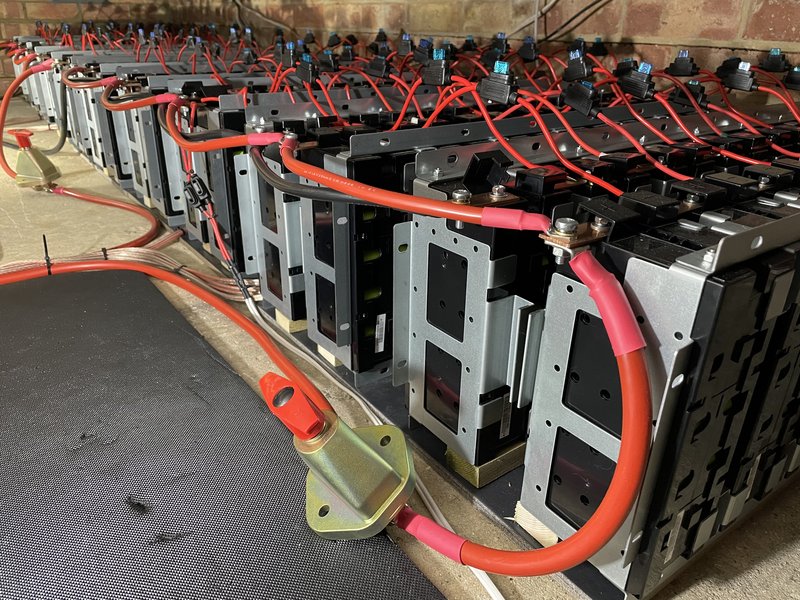
This is an old one I used to use (and still do for another application) which I reckon is ok for about 80A. Spec supposed to be 150A, I don't think so.
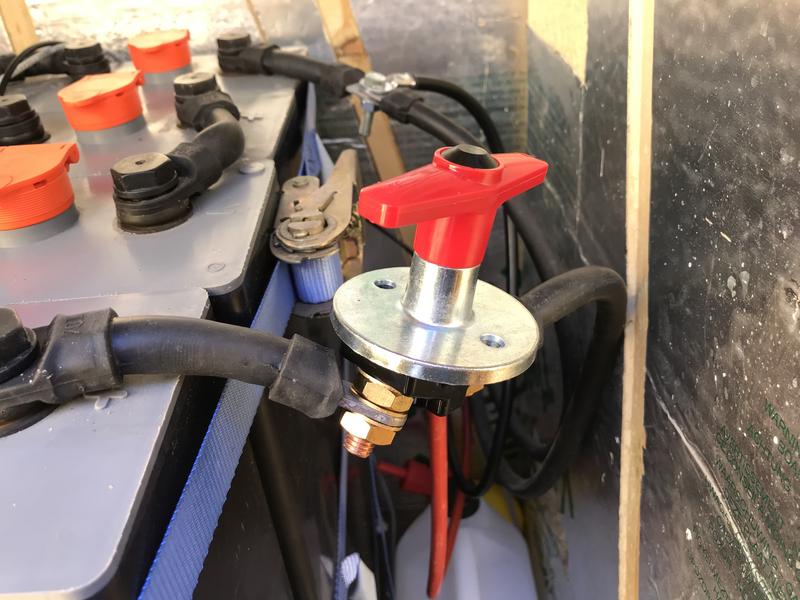
Extra copper, cos those battery bank fuses run hot.

Battery string fuses.
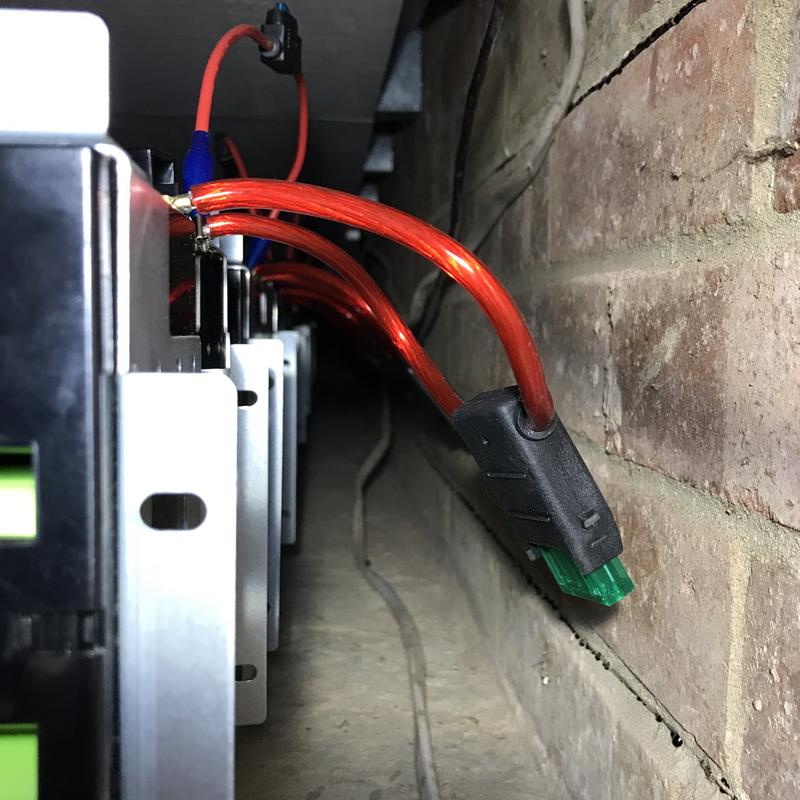
Fuses for my battery balancers.
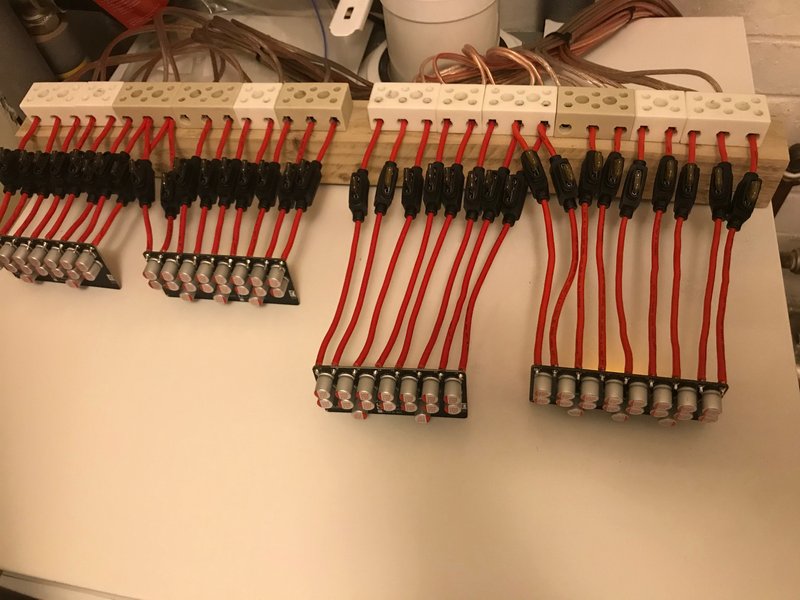
19.6kW PV > 114MWh generated
Ripple 6.6kW Wind + 4.5kW PV > 34MWh generated
7 Other RE Coop's
105kWh EV storage
90kWh Home battery storage
40kWh Thermal storage
GSHP + A2A HP's
Rain water use > 530 m3
Ripple 6.6kW Wind + 4.5kW PV > 34MWh generated
7 Other RE Coop's
105kWh EV storage
90kWh Home battery storage
40kWh Thermal storage
GSHP + A2A HP's
Rain water use > 530 m3
-
ClockmanFRA
- Posts: 132
- Joined: Sat Dec 04, 2021 11:04 am
- Location: Normandy, France.
- Contact:
Re: Battery disconnects
I recommend these for big systems.
I also use these large breakers between the batteries 48vda 800ah to 1300ah and the main power Inverter. These are Midnite or Outback.
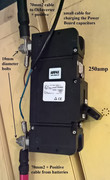
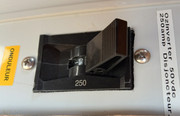
I use knife switches for seperate battery banks, 3off 48vdc 400ah, very large knife switches that are good for 200 amps are used. This is a off grid backup generator sysyem where the knife switch moves from centre off, down for Solar input into Batteries, Up for the standby generator forklift battery charger.
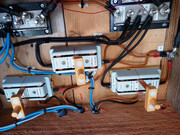
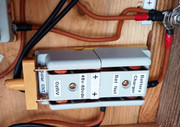
I cant to get these photos to rotate left and appear correct way up.
I also use these large breakers between the batteries 48vda 800ah to 1300ah and the main power Inverter. These are Midnite or Outback.


I use knife switches for seperate battery banks, 3off 48vdc 400ah, very large knife switches that are good for 200 amps are used. This is a off grid backup generator sysyem where the knife switch moves from centre off, down for Solar input into Batteries, Up for the standby generator forklift battery charger.


I cant to get these photos to rotate left and appear correct way up.
Re: Battery disconnects
YIS marine do a nice modular DC bus bar and breaker "lego" style product.
You can construct what you like and the nylon enclosures are fully modular so achieves compact form factor.
You can construct what you like and the nylon enclosures are fully modular so achieves compact form factor.